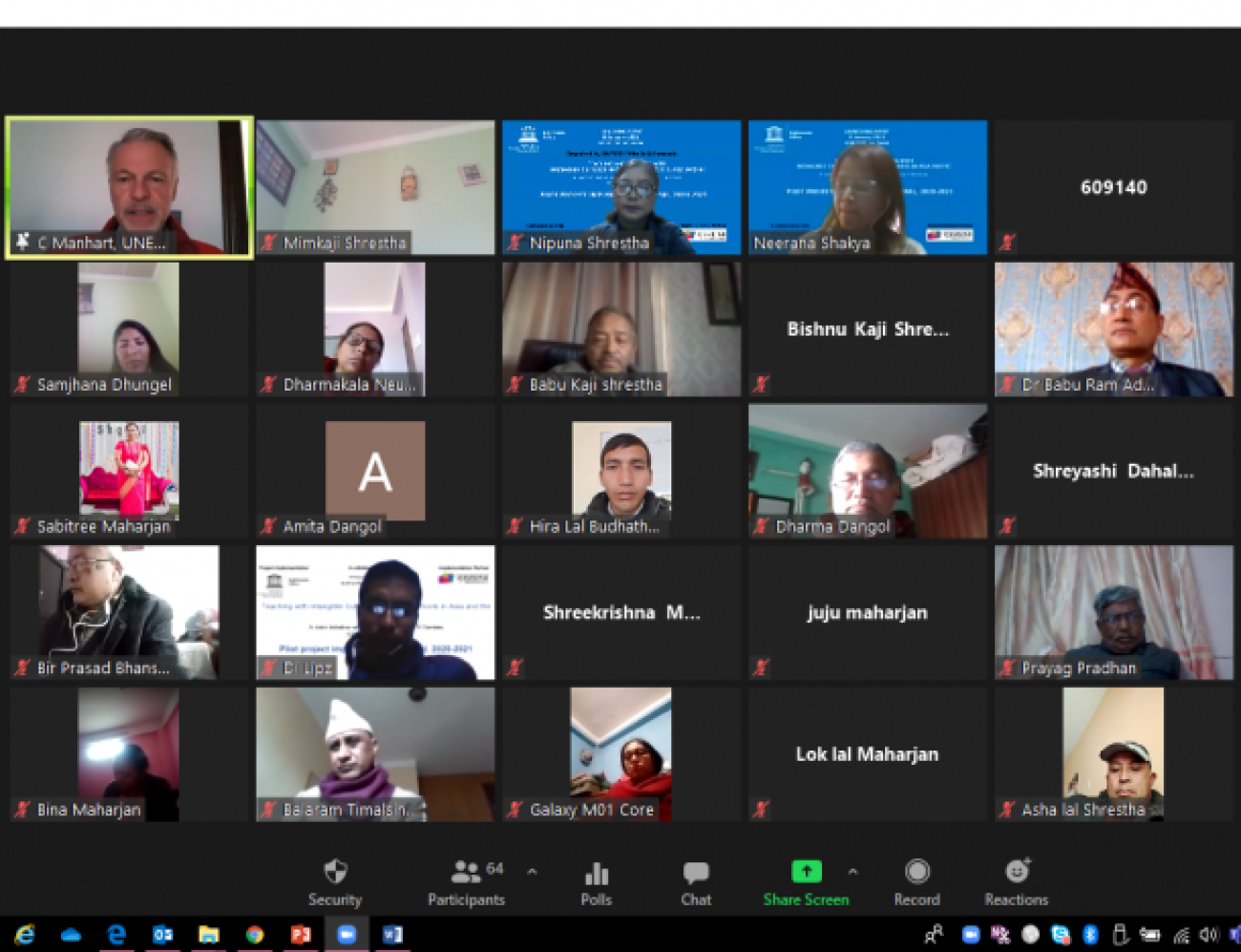Living Heritage in Schools: UNESCO launches pilot project in Nepal

Education plays a key role in safeguarding Intangible Cultural Heritage (ICH).
Experiences have shown that teaching core subjects such as mathematics, science or literature by using students’ ICH backgrounds can make the learning process more relevant, as it creates better connections between what is taught in classrooms and the children’s everyday life.
On 8 January 2021, UNESCO launched the pilot project “Teaching with Intangible Cultural Heritage in Schools in Asia and the Pacific” virtually in Nepal. The 65 participants included the mayors and officials from Budhanilkantha and Kirtipur municipalities; teachers and principals of pilot schools and community resource persons from the two municipalities; officials representing the Centre of Education and Human Resource Development and Curriculum Development Centre under the Ministry of Education, Science and Technology, the Ministry of Culture, Tourism and Civil Aviation, Nepal National Commission for UNESCO, and experts in education and culture. The event was followed by a preparatory session.
The main goal of the project is to strengthen the use of ICH in formal education, and in particular to promote it in various school-subjects through testing and validation of multiple teaching methods, materials, and lesson plans using ICH.
The project is being implemented in collaboration with the two culturally rich municipalities of Budhanilkantha and Kirtipur. The implementing partner, Srijanalaya, will prepare the team from four selected schools—Janasewa and Mangal from Kirtipur and Ganesh and Naulin from Budhanilkantha for the pilot project. Each school team consists of one person from the School Management Committee, three different subject teachers, and one community resource person.
Uddhab Prasad Kharel, Mayor of Budhanilkantha Municipality, stated, “The beautiful aspect of this project is to engage students which will help them practice and learn from their own living heritage,” while the Mayor of Kirtipur Municipality said, “Our living heritage is in the process of being lost. In this context, this project, involving students and those from the community, is important to safeguard our heritage.” Earlier, during information-sharing sessions with the two municipalities and their respective school teams during November and December 2020, both the Mayors had expressed their commitments to fully support the project, finding it both interesting and useful in the context of preparing and implementing the local curricula in schools.
“The cultural practices and knowledge that are meaningful to communities can provide context-specific content and pedagogy for education programmes, and thus act to leverage the relevance of education and improve learning outcomes,” said UNESCO Representative to Nepal Christian Manhart in his opening remarks. “In the meantime, this opportunity can help safeguard intangible heritage through education,” he added.
The preparatory session involved a participatory exercise to map ICH elements, where the community resource persons identified about 26 of their ICH elements and the school team discussed how these could be linked in the school curriculum, pedagogy, and other school activities. The mapping exercise engaged members of the communities and school teams to build up a good rapport and to jointly explore diverse living heritage elements from within their communities. The school teams representing both the municipalities expressed their desire to also include other ICH elements that could not be fully explored through this process. This mapping of ICH elements will continue and become a part of the pilot activities in the schools.
The result of the pilot project will be shared with the Advisory Committee which includes representatives from the Culture and Education ministries. The Advisory Committee has been formed to provide necessary input during the implementation of the project. The outcome of this pilot implementation is expected to be incorporated into the national education system in the future.
The pilot implementation is in line with Nepal’s commitment to implement the 2003 Convention for the Safeguarding of Intangible Cultural Heritage at a national level and will support its commitment to the SDG goal and target 4.7: by 2030, ensure that all learners acquire the knowledge and skills needed to promote sustainable development, including among others, through education for sustainable development and sustainable lifestyles, human rights, gender equality, promotion of a culture of peace and non-violence, global citizenship and appreciation of cultural diversity and of culture’s contribution to sustainable development.
This project is a joint initiative by UNESCO and its two Category 2 Centers: International Information and Networking Centre for Intangible Cultural Heritage in the Asia-Pacific Region under the auspices of UNESCO (ICHCAP) and Asia-Pacific Centre of Education for International Understanding (APCEIU). Nepal is one of six countries selected in the Asia-Pacific Region to join the pilot project.

